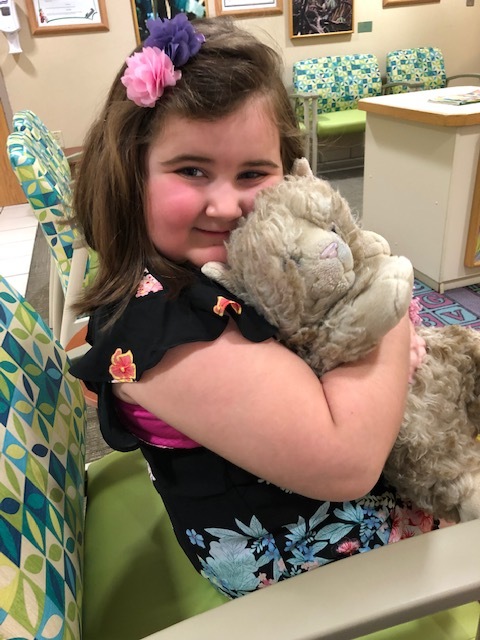Lillian Knowlton of Chesapeake, Virginia recently receives handheld blood analyzer.
Lillian Knowlton, from Chesapeake, Virginia, was diagnosed earlier this year with a craniopharyngioma brain tumor. We met Lillian’s parents at the Pituitary Brain Tumor Day at Children’s Hospital of Philadelphia this past March while she was inpatient and post-op from a tumor resection. Recently, Jennifer, Lillian’s mother, reached out to us because of the struggle of getting her sodium under control. She said Lillian was basically confined to the house because of the constant monitoring.
The challenges with diabetes insipidus (DI) for those with impaired thirst mechanisms due to surgical damage to the hypothalamus is that the hormone replacement to manage the body’s fluid levels can be very inconsistent. Some days the medication does its job and holds fluids in, some days it will not work at all, which means the patient could lose fluids and go into hypernatremia or severe dehydration. Alternately, it can hold in too much fluid forcing sodium to go too low. Either way, the result can mean seizures, coma, or worse. Without at-home testing, hospitalizations can be unavoidable. Jennifer has been monitoring Lillians inputs and outputs to try to manage her sodium to keep her in the acceptable range.
“It’s very similar to the 24/7 monitoring that had been done at the hospital, minus the testing. So currently, I am blindly adjusting her medications on a daily basis, Jennifer said. “I would love to have more freedom and for her to safely return to school to complete first grade. Unfortunately that can’t happen until we get a better handle on what to expect, and dosage that best manages her DI.”
On top of the struggle with sodium, there is also the constant lab visits where these pediatric patients are subject to numerous needle pokes to get the required amount of blood. For children, constant blood work is traumatic and many times, their veins get blown from all of the draws.
According to Jennifer, “I can’t express how immensely grateful we would be to have the ability to check her levels here at home. To be able to spare her the stress and pain she experiences at her lab visits. To have her results in minutes when unsure if dose changes should be made.”
Lillian received her blood analyzer this week, making her the 11th recipient. To-date, the Raymond A. Wood Foundation has provided over $100,000 of medical equipment and supplies to pediatric brain tumor patients battling the ongoing effects of the tumors and treatment. We hope Lillian’s family will get the peace of mind they deserve in caring for their daughter and that Lillian can go on to finish first grade and just being a kid.
We couldn’t help these children without your continued support. Please consider donating to help us provide medical supplies and connect families with educational and support opportunities.


